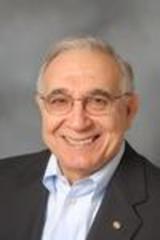Sabatino Sofia
Professor of Astronomy
 Sabatino Sofia, B.S. Yale College, Ph.D. Yale University, faculty member at Yale since 1984, you are one of Earth’s foremost students of the Sun. Your pioneering early work with Endal and with Chan illuminated the complex effects of rotation and convection on the internal dynamics of the Sun. These efforts were far ahead of the computational capabilities of the time, and continue to form the basis of work being carried out now. After teaching in Florida and serving at NASA, you returned to Yale to help lead the Center for Solar and Space Research, carrying out a vigorous research program including both theoretical work and a highly successful program of balloon—borne measurements of the precise shape and size of the Sun. These experiments will culminate soon in the launch of the PICARD satellite, which will use approaches you have pioneered to make definitive measurements of variations in the radius and temperature of the Sun. Recently you have devoted great effort to unraveling the effects of solar variability on the climate of the Earth, significantly reducing one of the great uncertainties in understanding the effects of human activities on climate.
Sabatino Sofia, B.S. Yale College, Ph.D. Yale University, faculty member at Yale since 1984, you are one of Earth’s foremost students of the Sun. Your pioneering early work with Endal and with Chan illuminated the complex effects of rotation and convection on the internal dynamics of the Sun. These efforts were far ahead of the computational capabilities of the time, and continue to form the basis of work being carried out now. After teaching in Florida and serving at NASA, you returned to Yale to help lead the Center for Solar and Space Research, carrying out a vigorous research program including both theoretical work and a highly successful program of balloon—borne measurements of the precise shape and size of the Sun. These experiments will culminate soon in the launch of the PICARD satellite, which will use approaches you have pioneered to make definitive measurements of variations in the radius and temperature of the Sun. Recently you have devoted great effort to unraveling the effects of solar variability on the climate of the Earth, significantly reducing one of the great uncertainties in understanding the effects of human activities on climate.
Originally from Italy, your early education was in Venezuela, and your devotion to Yale’s connections to Latin America has continued throughout your career. As chair of the Department of Astronomy in the 1990s, you initiated and nurtured close links to Venezuela and Chile that have benefitted many astronomers in both the north and south. In particular the Yale-Chile program that you began launched the next generation of Chilean astronomers on their careers, and has resulted in ambitious joint programs of research in stellar, galactic and extra-galactic astronomy. Nor have you neglected education closer to home. You also created a popular Yale course on Life in the Universe for Yale undergraduates, and for over twenty years you have led seminars of New Haven teachers. Across New Haven classrooms, remarkable models of the solar system bear a genealogical relationship to you, and untold numbers of paper and papier-maché flying machines have sailed off into sunsets under your influence.
“The best thing you can give to anyone is what you do best,” you once said about your work for the Teacher’s Institute. Your efforts to forge connections between the northern and southern parts of our planet, between scientists and the public, and between the Earth and its parent star, surely is that best, and will form a firm foundation on which future generations will build. Yale trained scientist who was global in every respect well before Yale had global aspirations, we are proud and deeply grateful for your efforts on behalf of science and of Yale, and we wish you sunny skies in all your future endeavors.
Tribute Editor: Penelope Laurans